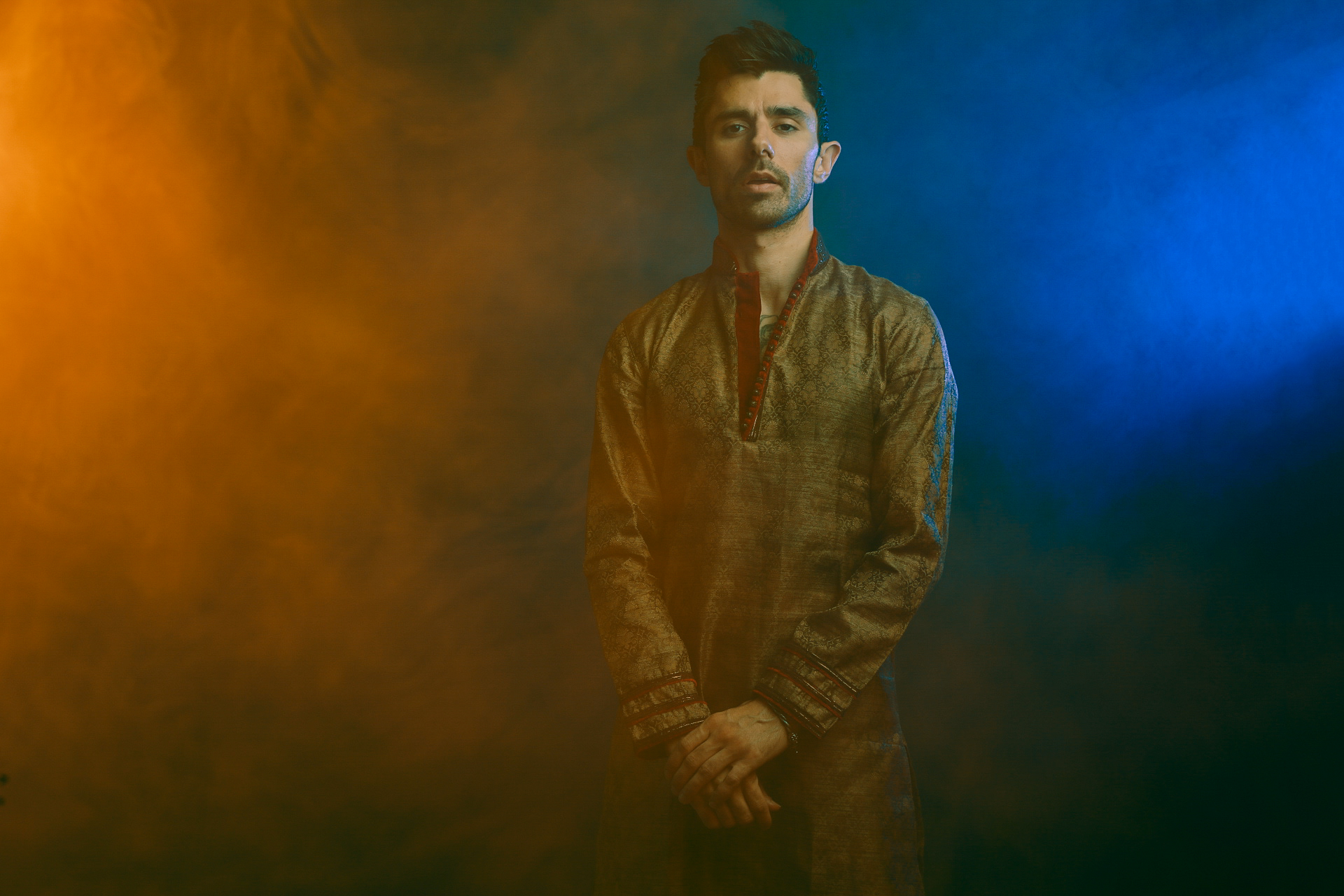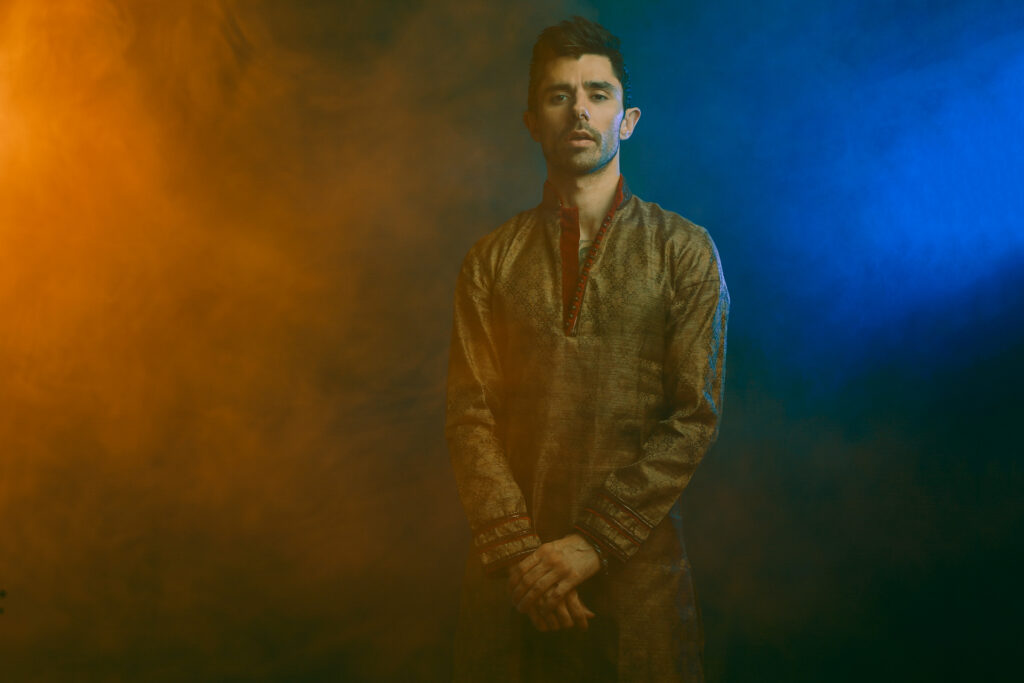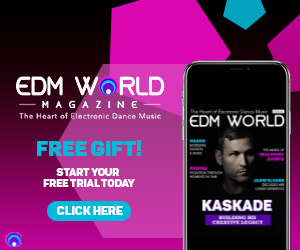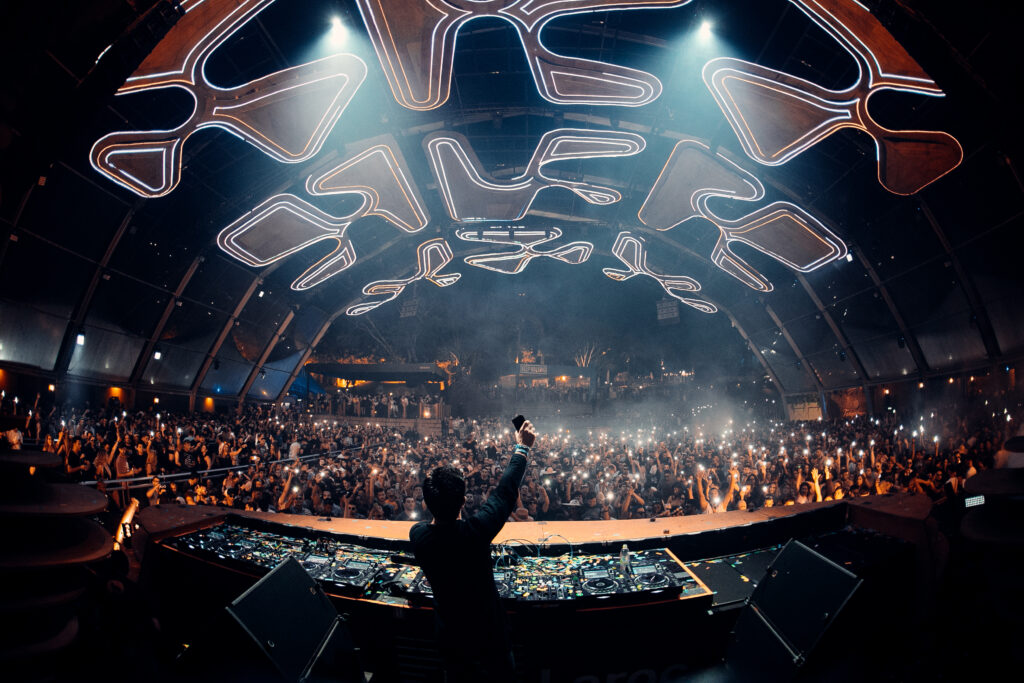
23 Feb KSHMR Reinvents Himself with Harmonica Andromeda
In This Article (Click on a section to quickly go to it)
 KSHMR Reinvents Himself with Harmonica Andromeda
KSHMR Reinvents Himself with Harmonica Andromeda
By Dani Omega
*This interview is older and was in our Issue 63 magazine.
KSHMR is a well-known producer and DJ who was born in San Diego, California. Being a veteran of the music industry, he’s known for making songs for some of the biggest artists in both the pop and EDM genres including Beyonce, Enrique Iglesias, Far East Movement, and David Guetta to name a few.
KSHMR started his music journey in a group called The Cataracs which was a hip-hop production duo responsible for the massive tunes with Far East Movement “Like a G6” and “Bass Down Low.”
As he transitioned into KSHMR, he co-produced EDM hits “Tsunami” by DVBBS and Borgeous, as well as “Stampede” by Dimitri Vegas & Like Mike, DVBBS, and Borgeous that helped catapult his new career in dance music. KSHMR became star status when he released his mega-hit “Secrets” with Vassy and Tiësto.
Through the years, KSHMR admits he tried to recreate the same status that he once received with his mega hits. Now, KSHMR is changing his process to focus on continuing to grow his fan base.
On March 19th, he is releasing his debut album Harmonica Andromeda. This album will demonstrate KSHMR’s producing capabilities which have truly been taken to the next level. I have personally fallen in love with “The World We Left Behind,” which features the unique style of Karra. I am sure you will fall in love with this song as well.
I had the opportunity to discuss his past, how he creates music, and his amazing album Harmonica Andromeda.
What initially got you interested in electronic dance music and what is your reason for continuing to pursue it as your career every single day?
I was making pop music and I sort of fell into it. I was first into hip-hop and then some of the songs of me and my partner David had in our group, The Cataracs, were more like electro-pop leaning.
We made the song “Like a G6” which got really popular and suddenly we were asked to produce pop songs for people. It was out of our element, but I tried to do it by putting that hat on and had varying success in some cases because it was a good fit. In a lot of other cases it was an awkward fit.
Then, dance music was trying to really hit mainstream popularity and guys like Will.I.Am was making their jump over to EDM. I found William to be very corny. I had the thought that if I tried to go into dance music I’d want to do it in a more frenetic way.
The way I accomplished that was by ghost producing at first. I thought of myself as just a pop guy but was going to try to start making EDM tracks for people behind the scenes and then some of those tracks got popular and I realized maybe I could really do this for myself.
EDM for me was a way to go from this paradigm of how can we write a song every day that is going to be bought by the masses and can provide something unique to the culture of dance music? If you can accomplish that, you’ll be rewarded with loyalty and be a part of a turtle-loving community.
I wasn’t really built for the world of pop music. I was struggling to keep up with it and dance music felt more of a natural home. I love the idea that you can go on an adventure with sounds and not have so many rules.
Can you share the story around the moment you knew you were all in on music and committed to doing it for a living?
I was just such a stupid kid. I had never even considered that it wouldn’t work. When I was in high school I was always leaving class and skipping homework. People would come rap at my mom’s house which was like the studio. I think about what my logic was back then and I just knew that if I could do this every day so relentlessly it would work out. It seems hard to believe now but being so naive really helps with all the L’s that you take along the way.
Just keep going and see where it takes you. You just have to get used to it even if you don’t even know how to do it. You just jump and then you figure it out. A lot of people in life theorize about things. For example, you go to a bar and you see stupid guys just winning and talking to girls while all the smart guys talk about what might happen “if” you go over there. Then you have a bunch of stupid guys who win because they went for it. You see that sometimes too in music. The best people win but it’s because they went for it and that’s what counts.
What is one piece of information you wish you were told before entering the music industry?
I think you get all the information and you know you don’t really understand it until you experience it first-hand. A lesson that is almost numb to people’s ears is to be yourself because it sounds so generic. If you’ve done music and you started out and you’re bad at making music, “be yourself” seems like really bad advice since it has failed repeatedly, but it’s true.
As a veteran producer, what is one thing you’ve learned recently that you truly weren’t expecting?
I’m making this new album and I’m more excited about it than I’ve ever been about anything. I wrote this tweet recently saying how good I thought it was and I think I said something like, “I think this is one of the most ambitious electronic albums and maybe even one of the best electronic albums” and then some other stuff.
I usually get 15 or so replies but all of a sudden, I had a thousand fans on Twitter that were just ready to strike me down and became very upset that I would make such a claim. I understood but I was also a little bit surprised by their reactions.
Someone who was sort of respected in the dance music sphere for all the work that I put in and other work that I put in other music and to never make a claim like this before – It was interesting to see how suddenly people give a shit about what I said when it upset them and I would think at this point I’d have some respect.
I thought I’d get a little more respect for making a claim like that, but I got a lot of lessons on what music I need to listen to, and now I’m just a “big room producer.” Then I said, “I’ll just wait to show you guys the music.”
This has been a new experience for me. To say something that people didn’t like online. It’s crazy how people can all of a sudden go after you, after just one tweet. I didn’t know anyone looked at my Twitter besides the 20 or so core KSHMR fans. To be fair, it was a very declarative statement. I guess it’s really hard to communicate that with production.
You go into the studio every day until the late hours in the morning until you make this thing that you feel is going to make people’s lives better. To be honest with you over the last week, I’ve found myself really frustrated. I feel like I can’t get my feelings across, but I’m just so excited about the album and it felt like the internet just piped up as I decide to be excited about something.
They’re fine with you when you’re quiet, keep it to yourself, and stay humble. However, I think people should be able to kind of say crazy shit if they worked really really hard at it. They should give a little respect if you spend your whole life on it.
I should stay off the internet honestly.
How do you approach adding your Indian heritage into your music with different melodies and sounds?
It’s a taste thing. I felt there’s so much to explore but the culture of music in India is really rich. It’s one of the most influential Bollywood influences not only in India but neighboring countries as well. If you really look at true Indian music there is a lot of freestyle. Many of the instruments like the sitar are not exactly compatible with dance music. You find the catchiest melody of it and then find a way to make it hit as hard as possible.
When you’re making EDM music, at least for me, it does get a little bit boring. It’s like a symphony of robots so you add real instruments. I’m not limiting it to just Indian instruments, but I really like to use any organic acoustic instruments from America and all over the world in combination with the dance elements to get some soul into it.
There are scales that when you hear them like the Middle Eastern Phrygian Dominant scale is a really big one, are immediately distinct. They are very Indian influenced but sometimes that makes something and I think there is nothing Indian in my style, I think it’s just my name that creates the association but I will say on this album, there is some but it’s quite a lot of just what I could do with any instruments I can find and they’re so strangely a weird like I’m freaking choir thing that comes up a few times.
The first single off your debut album Harmonica Andromeda with “The World We Left Behind” featuring Karra definitely has different sounds similar to Porter Robinson mixed with The Lion King compared to your past releases. Did those inspire you for this song? If not, what did and how did this song specifically come about?
The thing that excited me about doing the album was starting to get really into movie scores. I would say Gladiator is probably my favorite score that I really fell in love with. I have some infatuation with these borderline cheesy Uniworld instrument-driven tracks that you hear, like in the Lion King’s “Circle of Life” which is the absolute peak of human emotion like the world coming together. That is like the most beautiful thing in the world and I was obsessed with this idea of the African choir that you hear at the beginning of one of my songs.
I followed different melodies that came out of the African choir and then worked with Karra to write a song that had the “let’s have the best night of our life” concept. It’s truly powerful that you really feel connected to those around you and know how to put that into words.
I love Porter Robinson because he can strip things down to really raw emotion and I really respect that Porter doesn’t avoid cheesiness. He really goes at it unapologetically and then it becomes not cheesy. Music is really vulnerable and pure joy for me. There’s nothing about trying to be badass about it. That’s how I felt at that moment and about the world. Stripping back everything except the little kid in me. I think that’s the music; a place to be vulnerable from the heavy adult skin.
What’s it been like working with Karra over the past year after collaborating on a few different releases now such as “Devil Inside Me,” “Take It Slow,” “Scare Me,” and the latest “The World We Left Behind”?
Karra is the best writer at the moment and she’s my favorite one to work with. Her vocal range and her styles are amazing and honestly, it’s everything I could ask for. She can sing opera. She can hit these insanely high notes and her voice is sprinkled across the album. She’s such a good friend. She came over and she just recorded little sprinkles that I put all over the album so even on the songs that she’s not featured on, she’s there in some way. You could hear her voice if you pay attention. She’s just so cool.
We hang out on days that have nothing to do with music. I feel like I have to fight to make sure that people hear her music. I’m involved in her artist project personally and I want to protect her. It’s like the universe is almost against you if you’re nice and you’re talented. Someone’s gotta look out for you and I want to make sure that happens for Karra.
What genres of music will be heard on your new album Harmonica Andromeda and who else did you collaborate with besides Karra?
I also collaborated with Jake Reese, whom I did the song “Carry Me Home”. There’s only one other producer whose name is Mahmoud and we did this song called “Slow” which also features Karra. Mahmoud is a really great producer from Turkey and for that song we stayed in Israel during the tour to record some Turkish instruments. Mahmoud was involved and he did a great job at adding his production.
There were a few cases where I got help from my friends who are producers. I had this hip-hop section where a really great producer helped me with some of the drums. I’ve been very fortunate in places where I’ve been stuck that I’ve been able to ask my producer friends and they’ve been able to really help me along the way. The songs were already very close to being done so they weren’t featured but I think Mahmoud might be the only producer that was properly featured.
Which tracks are you most excited to release from Harmonica Andromeda and why?
There’s one called “Midnight Lion Walk” which kind of puts you in the shoes of this lion as it goes through many radically different phases of the jungle. That one’s really fun if you’re into western-influenced music.
“Blood In The Water” has a badass and mystical beginning. It’s like a Dr. Dre inspired track cause I’m a hip-hop head.
There’s another song called “I Will Be A Lion” that I wrote when I was just feeling really insecure and in the dumps because I was unsure if I had any good music left in me.
Towards the end of the album, there’s one called “Paula” and I actually sing on that one and that’s about my mom.
Knowing it takes a village to make and release a debut album, how many people are you working with on both the label and creative side for Harmonica Andromeda and what are each of their roles?
Anything about the music industry only got started by my best friend’s older brother. He’s my main manager named Carlo. Right next to him is Carly. She’s amazing and always on top of it. I’ve got Justin who helps with everything related to life and Nicorette because I’m a big Nicorette guy he keeps me going, haha. Anthony, my best friend, helps with the visuals of Carlos’ older brother so it’s somewhat of a nepotistic community.
Freire is this amazing crazy guy out in Israel who plays every instrument and if I had some requests for getting people together, he’ll do it. He is so resourceful! He’ll get like a little group of kids together to sing. His own music is so beautiful. He can pick up any goddamn instrument in the studio. I think he’s looked over a little bit. He has been a big contributor to the album.
As someone who works with a close team of writers and vocalists, what are the skills or qualities you look for when you decide to bring in new talent to work with? What makes you say, “I want to work with them again?”
You either got it or you don’t when it comes to corny ideas. Songwriting is a sensitive thing. I mean, you’re saying, “Hey I’m going to say my emotions to you.” For the song, I’ve still got to put my emotions on the line a little bit and be fearless about that. The writers should recognize what is the most basic way to say something and find the most clever way of saying it. People either have that radar or don’t.
When working with some people, every idea in the studio is something generic. You almost get exhausted because as a producer, you’re trying to steer them in the right direction, but when you become this brick wall to every idea they have, it feels unproductive. I try to do my best to steer them in a direction that I think is best for the song but you know with the best like Karra, it doesn’t take a lot. People like her have a good radar for what’s corny and obvious and then what’s a little more unexpected that’s going to make you feel something.
Have you ever dealt with burnout? How do you stay inspired while making music for not just yourself but also for other artists?
I definitely experience burnout. Success leads to burnout especially if you have sort of unmitigated success that seems like it’s not going to end. I think I really caught a stride at first with KSHMR coming out swinging having all these Beatport number ones or Billboard Top Ten. All these metrics for success are ones I didn’t want to admit that I got attached to.
It got to a point where I was beat from traveling. It was unfulfilling because I wasn’t in the studio experimenting and exploring new sounds. Sometimes it takes me a while to really understand my emotions like, “Hey, I’m not being fulfilled here.” So, I definitely experienced burnout because I was killing it touring and all that but not in the studio.
I was just trying to keep the machine running and was being spread too thin. I was just doing what I could do to get by for releases instead of exploring and taking the time to find new things. For me, being in the studio is where things always progressed. If you’re not progressing, that can be a really really tough pill to swallow and it can make you feel unsatisfied and resentful.
Quarantine has honestly been great for cortical burnout and getting stuck because with all the time in quarantine it allowed me to explore, not rush it, and allow myself to fail. That’s part of the process until I’m making something that really inspires me. Now I’m in this place. I feel so inspired and so happy. It’s like having a steak in your belly as opposed to Doritos.
What are your go-to VST’s when making music?
I’ll be honest, it’s been a lot of samplers recently and I am like the overlord of Kontakt, haha. I’ve got so much Kontakt stuff and I never get bored of it because you’re always making new sounds and have so many beautiful detailed articulations. The level of detail that you can get with Kontakt is just amazing. Some overlooked ones are Engine, which is basically like Kontakt, so you’ll find some really interesting stuff with Engine.
UVI workstation has a great world instruments series. If I know what to do, for example, if I need a square wave and don’t need a specific instrument, I’ll typically make something in Sylenth or Serum. I use it all though. I hate admitting that I like Nexus because sound design users resent Nexus. I could go really deep into it and tell you all the different libraries but it’ll take all day.
What is one important personal goal you have yet to achieve and why is it a priority for you?
I’ll tell you a story. When I was young, I went on a trip to a Jelly Belly factory. After the tour, I got to go to the factory store and buy whatever I wanted. My dad gave me five bucks and my friend Brittany got twenty bucks. I went to my dad and said, “Brittany got twenty bucks. Is there any way you could do it?” He finally gave me twenty bucks which was a lot of money back then.
We went to the shop, at the end of the tour, and I was so excited. I’m trying to pay for my favorite candy and eventually they call us to leave. In the end, I didn’t get to spend any of the money. I had the twenty dollar bill in my pocket. I didn’t buy anything.
I’ve always thought about that moment of wanting to find the perfect thing, but instead, I ignored all these great things that I could have bought. I’m always wanting and thinking there could be something more perfect and I think it’s done me very well with making my music better, but I hope it reaches a point where I’m happy and content.
HAVE YOU SEEN KSHMR? SWIPE UP TO COMMENT BELOW




No Comments